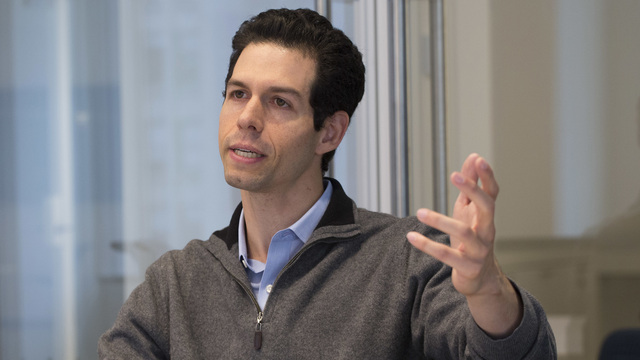3G Capital: Business Operators Make Better Investors & Vice Versa
In the investment world, there often seems to be little overlap between those who own and operate businesses and those who invest in them. But 3G Capital is shifting that paradigm. The investment firm has a simple but powerful philosophy: to be an investor, owner, and operator all at once. This is also a perspective long shared by 3G Capital’s sometimes investment partner Warren Buffett, chairman and CEO of Berkshire Hathaway who famously was qouted 30-years ago saying: “I am a better investor because I am a businessman, and a better businessman because I am no investor.”
3G Capital’s hands-on approach to investment — and its focus on long-term value — has seen the firm achieve success with household names like Burger King and Hunter Douglas. And that’s been the plan from the get-go.
Alex Behring co-founded 3G Capital in 2004 alongside, Jorge Paulo Lemann, Marcel Telles, and Carlos Sicupira founded to invest in select companies across the U.S. and globally. Today, Behring and Daniel Schwartz, who served as an investment analyst from near the firms inception and later the CEO of Burger King, (which became Restaurant Brands International in 2014) are the firm’s co-managing partners.
Over the firm’s almost 20-year history, 3G Capital has only invested in a handful of major companies. One of its first acquisitions, in 2010, was one of the world’s most recognizable brands: Burger King.
In 2014, 3G Capital’s Burger King merged with the Canadian coffeehouse and restaurant chain Tim Hortons in partnership with Warren Buffett’s Berkshire Hathaway. The investment firm also partnered with Warren Buffett’s Berkshire Hathaway to acquire Heinz which later merged with Kraft Foods. Most recently, 3G Capital acquired a 75% stake in Hunter Douglas, an international leader in the window coverings industry in partnership with the founding family who had controlled the business for the prior century.
3G Capital’s Unique Investing Approach
There are several reasons why 3G Capital has such a small but exclusive portfolio. The high-quality investment opportunities it seeks to acquire rarely arise. Then there’s the not-so-small matter of 3G Capital’s unique investment style.
3G Capital doesn’t acquire investment opportunities with the intention of selling the asset and making a profit within a quick number of years. The firm carefully chooses between options and invests for the long haul.
Unlike many investors, who tend not to get involved in their acquisitions, 3G Capital takes an active role in operating and growing its portfolio companies. The firm works directly with these companies’ key leaders and stakeholders. 3G representatives act as company owners, taking steps that only a personal, deep investment in the business could inform.
“We are owner-operators first and foremost, as our owners are the individuals directly responsible for operating our companies,” Behring told the Financial Times.
Taking an owner’s perspective means 3G Capital is intimately involved in the company’s long-term prospects. “Everyone at 3G has considerable skin in the game, which creates powerful incentives to do what is right for the long term,” Behring said.
This philosophy can help businesses spark a renaissance of the kind Burger King experienced when 3G Capital took over in 2010. The dynamic approach has the effect of a startup operating inside a large, established company. Since its 2010 acquisition of Burger King, 3G has been the company’s largest shareholder supporting the company’s global growth transformation, including the creation of RBI and acquisitions of Tim Hortons, Popeyes Louisiana Kitchen, and Firehouse Subs, generating approximately 21x in total shareholder returns.
Investing With Deeper Intention
Private equity firms typically have multiple funds, each with dozens or even hundreds of companies. While diversification has advantages, this approach can cause some private equity concerns to view their acquisitions like a line of data on a portfolio spreadsheet.
In contrast, dealing with assets as long-term partnerships involves a significant amount of time, effort, and resources. 3G Capital only works with a select number of companies, for this reason, investing with much deeper intention.
To that end, eschewing diversification for a more exclusive portfolio has other benefits. Overseeing fewer businesses allows for faster communication between 3G Capital and the portfolio companies’ teams. If issues arise, the teams can deal with these challenges swiftly. 3G Capital’s smaller portfolio allows the firm a responsiveness that companies with more extensive portfolios would struggle to match.
3G Capital: Investors, Owners, and Operators
Based on prior sparse media reporting, 3G Capital seems to believe investors with business ownership and operations experience tend to focus more on long-term growth and the needs of a business and its employees, like a view taken by Warren Buffett and Berkshire Hathaway.
Behring emphasized this in his Financial Times interview: “Our culture of ownership leads to responsible stewardship of capital and resources at all levels of our organizations and manifests itself in every business decision we make.”
To support its investor-owner-operator business philosophy, the company ensures its executives gain experience in investment and operational roles. As a result, 3G’s teams have both investing and business management skill sets.
Investment experience allows 3G executives to view businesses as assets. This way, they can assess key performance indicators while maintaining a long-term investment perspective. Investment experience also enables 3G executives to efficiently allocate capital in areas like marketing, international expansion, and research and development.
Investment analysts rarely get involved in the nitty-gritty of running a business. However, 3G Capital understands that there’s a sizable difference between interpreting numbers on a screen and dealing with real-world business operations.
Nearly 15 years ago, then investment analyst Daniel Schwartz identified Burger King, help lead 3G’s acquisition and was later appointed CEO at age 32, making him one of the youngest major restaurant CEOs in history. As quoted in Business Insider “I came across Burger King, and my theory was that the value of the brand was much bigger than the value of the business,” he said. “It was the second-largest fast-food chain in the world with $14 billion in system sales, and it was operating in 80 countries, and its total value was only a few billion dollars compared to McDonald’s,” which had a market cap of about $60 billion at the time.” Since then, Schwartz and the team at 3G have been working to make this into a reality. In 2010, Burger King corporate was one brand with 12,000 stores and sales of $15 billion across the entire organization. Today, under the RBI banner, the company comprises four of the world’s most prominent and iconic quick-service restaurant brands, with more than 30,000 units, and over $40 billion in organization-wide sales across more than 100 countries, of which approximately 30 appear to be new market entries.
Successful partnerships between businesses, especially multinational ones, require mutual respect for the strengths and cultural differences of others. Neat Excel spreadsheets often fail to convey the subtleties and complexities of how businesses — and people — really work.
3G Capital maintains a tremendous respect for the operations of the companies it acquires. Working as business operators allows the firm’s executives to gain a richer, more nuanced understanding of its portfolio companies.
Reflecting on the early days of his experience, Schwartz who became a 3G partner at 27, told Forbes “The group believes in investing in young people and giving them opportunities,” he says. “I worked hard and proved that I really cared. More so than anything else, I put the business and the firm ahead of myself.”
3G Capital’s Partnership With Hunter Douglas
3G Capital’s recent partnership with Hunter Douglas is the perfect illustration of its business philosophy.
Hunter Douglas is a prominent manufacturer and retailer of window coverings. The family-owned business has a rich history spanning a century and a reputation for innovation and top-tier management.
Today, Hunter Douglas operates in more than 100 countries. The company boasts an exceptional team of founders and entrepreneurial managers and an unparalleled network of fabricators and dealers.
3G Capital secured a 75% ownership stake in Hunter Douglas in February 2022. Ralph Sonnenberg, the patriarch of the company and the founding family, sold his shares in a deal that placed Hunter Douglas’ valuation at approximately $7.1 billion.
3G Capital sourced the transaction through an established relationship with the Sonnenberg family, members of which remain actively involved in the company. These individuals have retained operational positions to work with 3G Capital in the long term.
The Sonnenberg family also maintained a 25% stake in Hunter Douglas, ensuring continuity in the company’s operations, both on a daily basis and in the long run.
All parties viewed the partnership between 3G Capital and Hunter Douglas as one destined to last. The relationship would mutually benefit 3G Capital as investors and Hunter Douglas as an operating company.
Not long after making the deal, Behring and Schwartz built a new management team for Hunter Douglas. Behring and Schwartz’s objective sought to create a crew that combined the strengths of both companies to steer Hunter Douglas toward ongoing growth and operational enhancements.
The new management team included existing Hunter Douglas executives, 3G partners, and members of the 3G global network. João Castro Neves, 3G Capital senior partner, became the CEO of Hunter Douglas Group.
A Family-Led Culture
At the time of the deal, David Sonnenberg said: “As a private enterprise, Hunter Douglas will have the opportunity to advance and expand our business while preserving the family-led culture and strong relationships with stakeholders which have been core to our success.”
This family-led culture is fundamental to Hunter Douglas, which has acquired and worked with many other family-owned businesses. Hunter Douglas choosing to partner with 3G Capital speaks volumes about the investment firm’s philosophy.
The same could be said of Warren Buffett’s decision to partner with 3G Capital. It’s well known that Buffett has an inclination to buy family-owned businesses and retain existing management.
3G Capital offers a compelling investment prospect for family businesses undergoing succession or hoping to build a long-lasting brand. Working with the firm can provide access to the kind of international network and operational rigor ideal for facilitating sustainable, long-term growth.
3G Capital’s portfolio companies are a good example of the kind of legacy-building the firm values. Heinz was founded in 1869, Burger King in 1954, and Hunter Douglas in 1919. These are established brands that have existed for generations, weathering the storms of the market.
3G Capital hopes to be part of the story of making these brands even bigger and better. As Behring said: “At 3G, we are owners of great businesses and brands and our goal is to grow them. We are also promoters of people, and we believe that we attract best-in-class talent because of our long-term focus. We’ve been building businesses for over four decades. We dream big.”


